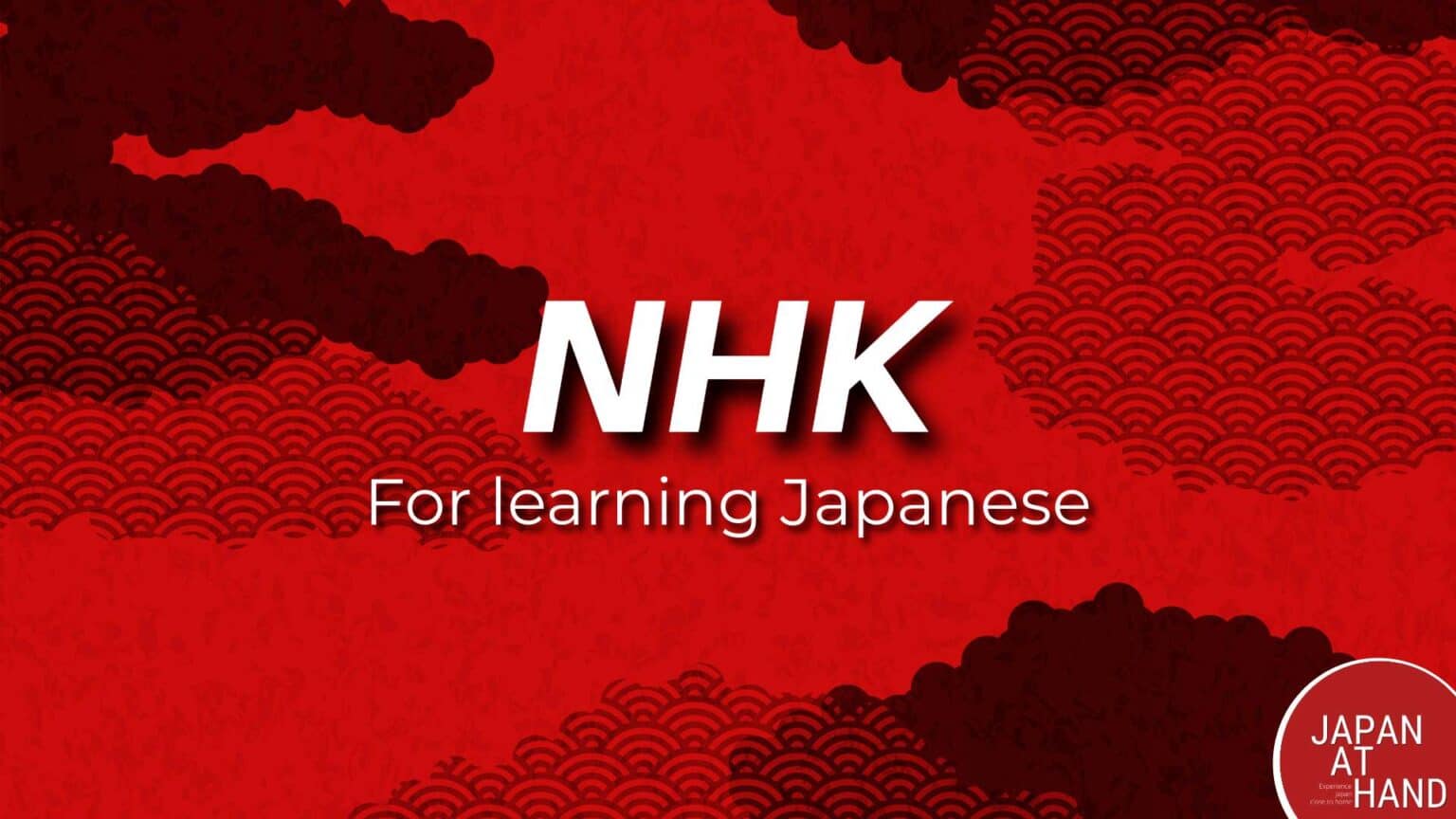Quick selection
-
Lots of options
-
NHK News Web Easy
-
NHK World-Japan learning portal
-
— News articles
-
— Dramas
-
— Work related scenarios
-
Thoughts on usefulness
Lots of options
In our ongoing quest to find the most useful resources for learning Japanese, who better to turn to than native Japanese speakers, as well as those responsible for providing Japan with its national broadcasting service? I’m of course talking about Japan’s NHK.
As a whole, the NHK service caters towards fluent native Japanese speakers, however, there are sections within it that can prove useful to overseas students looking to improve their Japanese language skills. Specifically there is a section entitled NHK News Web Easy that — as the name suggests — consists of easier reading material, alongside NHK World podcasts, mini-dramas, and learning scenarios that can be very useful.
I want to dive into all of the available tools and services and find out if using NHK for learning Japanese can be genuinely useful.
NHK News Web Easy

For those looking to get some frequent up to date reading practice, NHK News Easy might prove to be invaluable. The site is dedicated to providing news stories both nationally and internationally in a greatly slimmed down version, featuring simpler sentences, vocabulary, and kanji usage. Its original purpose is to help Japanese children understand news stories in a simpler manner.
Aside from being just plain easier than their adult counterparts, each news article has other features that can help you in a number of small ways. Perhaps the most major addition is the option to use furigana; the regular hiragana symbols displayed above the kanji. This means that even if you don’t recognise a specific kanji, you can still read, voice-aloud, and even look up the word in a Japanese dictionary to help you learn new words and meanings. There is also a short video accompaniment with every article in which you can practise your listening skills too
You’ll need a somewhat moderate level of Japanese to regularly get the most out of these stories, but once you do, NHK Web Easy allows you to follow along with current Japanese news stories which in itself will be great for your confidence. The simpler text allows you to more acutely focus on things like sentence structure and particle usage too, which can often prove difficult in regular Japanese texts. It’s very much a lifeline stepping stone that paves the way towards higher reading comprehension.
Lastly there is the ability to click on a few select words within the text to display what they call their dictionary, this however is more often than not pretty useless for us. It will describe the meaning of the word in Japanese where you will often encounter more words you don’t know — meaning you can’t decipher the definition and hence the word you sought to learn.
You might also be interested in:
Kanji From Zero review: a useful Japanese resource?
NHK World-Japan learning portal
The NHK World name is another sub-section of the bigger NHK brand this time primarily aimed at delivering news in English for a worldwide audience — much like similar ‘world’ services to other major broadcasters. But, part of their service includes a section on learning and improving Japanese which includes the likes of podcasts, dramas, and numerous other tools and videos.
Let’s take a look at a few of them.

News articles
Unlike NHK Web Easy, the NHK world’s ‘learn Japanese from the news’ section is built for learning. As such, there is a much greater emphasis on breaking down and explaining much of what is seen or heard and is really quite comprehensive in its approach.
You can find articles that are mostly shorter in length and feature straightforward language; yet, going even further, every line is translated into English which is contained within a drop-down revealing box. Inside these you will also find contextual information as well as the breakdown of specific words that are the most relevant, useful or important within the Japanese language. It’s a fantastic way of checking your knowledge and understanding and finding new words.
However, each article offers so much more. Such as:
- A video accompaniment that is fully voiced and matches the text word for word.
- A robust set of questions relevant to the article.
- An added fully-voiced fictional dialogue that contains the same features as the main article.
There is a lot to digest within each article and most importantly offers genuinely useful tools that can profoundly improve your Japanese if you were to use the service regularly.
Dramas
Instead of learning Japanese from the news, NHK also offers a ‘learn the language from a drama’ option. These are in principle much like any other drama series, featuring a continually running weekly program, however, they are much shorter in length and broken down into sections. The runtime is often around 15 minutes but only 6 or 7 minutes is purely spoken Japanese drama; the rest is an analysis of what was seen and heard, followed by case real-life studies — in English.
If I’m being perfectly honest here it’s only the actual ‘drama’ portion that is worth watching; the rest is rather disappointing and not overly useful or informative. Still, the 6 or seven minutes we do get is quite good, it’s a refreshing way of improving your listening skills in perhaps a more enjoyable way (compared to news stories).
It’s quite easy to learn things by watching too. There are subtitles in both English and Japanese on top of each other which can help piece together or confirm your own abilities, and the vocabulary and speed isn’t too extravagant; it feels all quite relaxed and natural, not too easy but not bewildering either.
These dramas can be good for late beginner and intermediate learners — depending on the episode.

Work related scenarios
One of the biggest parts of the entire learn Japanese section is the dedication to work related scenarios, phrases and vocabulary lists.
They are separated into lessons much very similar to how the news articles are presented, with each lesson focusing on one or two core phrases that will prove useful in work environments. However, upon diving into each individual lesson you will discover that they are far more detailed in every aspect. Let me explain.
By now the presentation should be very familiar; there is a featured video along with a transcript of the exact wording of what is said; yet here, in all of the nearly 50 odd lessons on the site, the breakdown of every line is nothing short of immense.
Almost every word and set phrase is actively explained and expanded upon as well as linking to the exact part of the video that a particular sentence is heard. There are also links to alternate vocabulary lists that may be used to achieve the same meaning. This is alongside familiar quizzes and such ensuring that you fully understand absolutely everything.
These work related lessons are so packed, you could easily spend a couple of hours on each to fully cover your bases. In short, if you are seeking to learn Japanese for work reasons, you don’t need to look much farther than this as it offers everything you possibly need.
Thoughts on usefulness
I have looked at a lot of Japanese resources on this site including Satori Reader and Japanesepod101, both of which are paid services; access to NHK on the other hand is completely free. Considering this, what you’ll find is that some parts are quite similar, some you may even come to prefer.
There’s certainly no shortage of content to be found here and is regularly updated each week with new material. This in itself is quite neat, yet, along with the real life topics and curated scenarios, there is a real sense of progression knowing that you are learning words and phrases that are actually used, rather than (for the most part) fabricated scripts and words you may hardly use. Learning through NHK gives a tangible sense of being able to interact with Japanese society — even in a simple manner.
There are of course some areas which are disappointing; such as some of the unnecessary bloat found in videos as well a somewhat childish-like presentation that is quite common in a number of areas. It’s almost an assumption that if you are learning Japanese, especially with the beginner content, you must be under 10 years old. It’s this aspect that will probably make you seek elsewhere if you don’t have the patience for it. However luckily it doesn’t appear in everything.
If you can get past some of these negatives, the actual content will be incredibly useful, both for absolute beginners of Japanese up until those at an intermediate level. However, even if you use other learning platforms, the NHK service may cover material that is slightly different to elsewhere and is worth checking out.
Nathan


